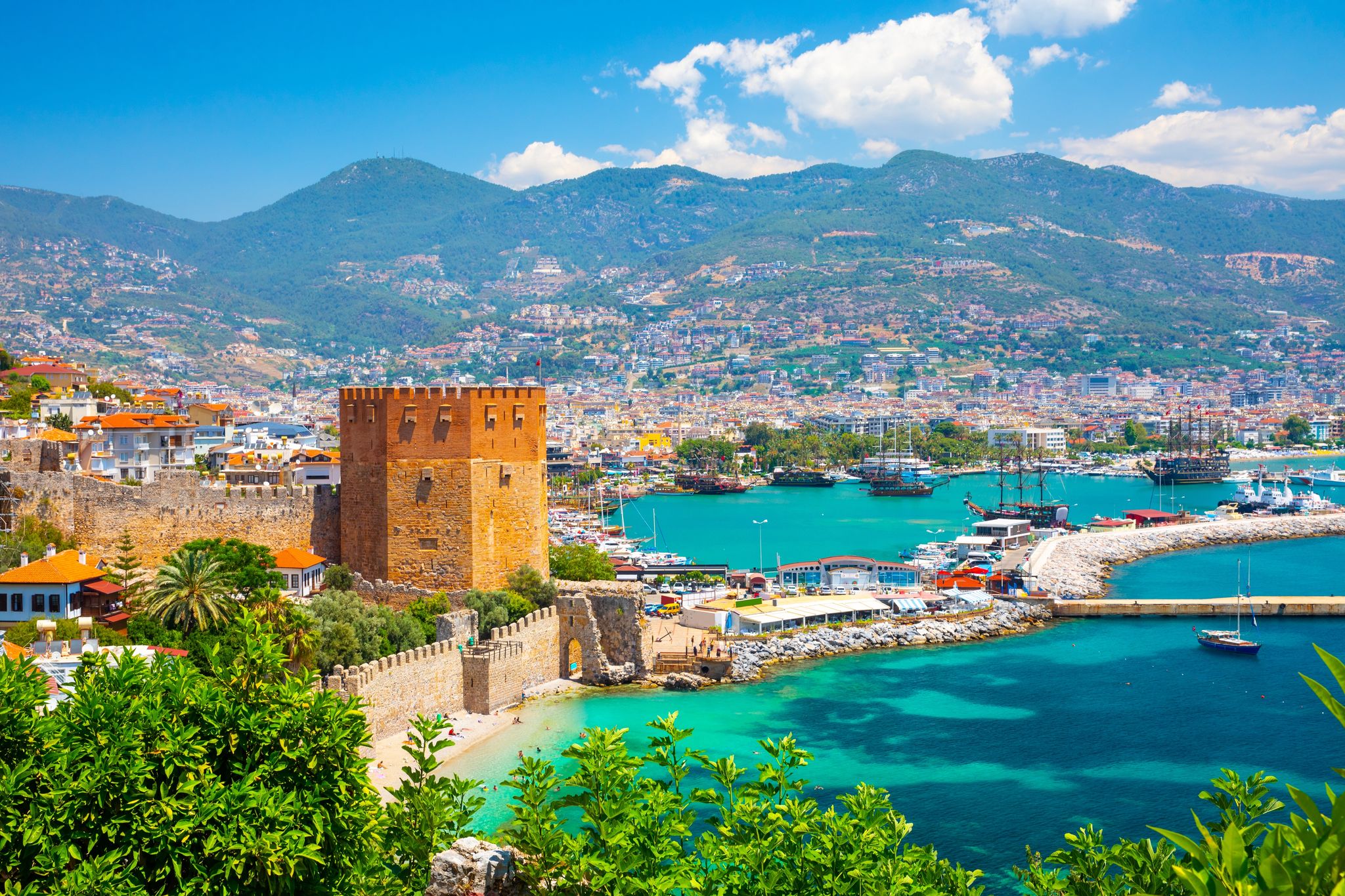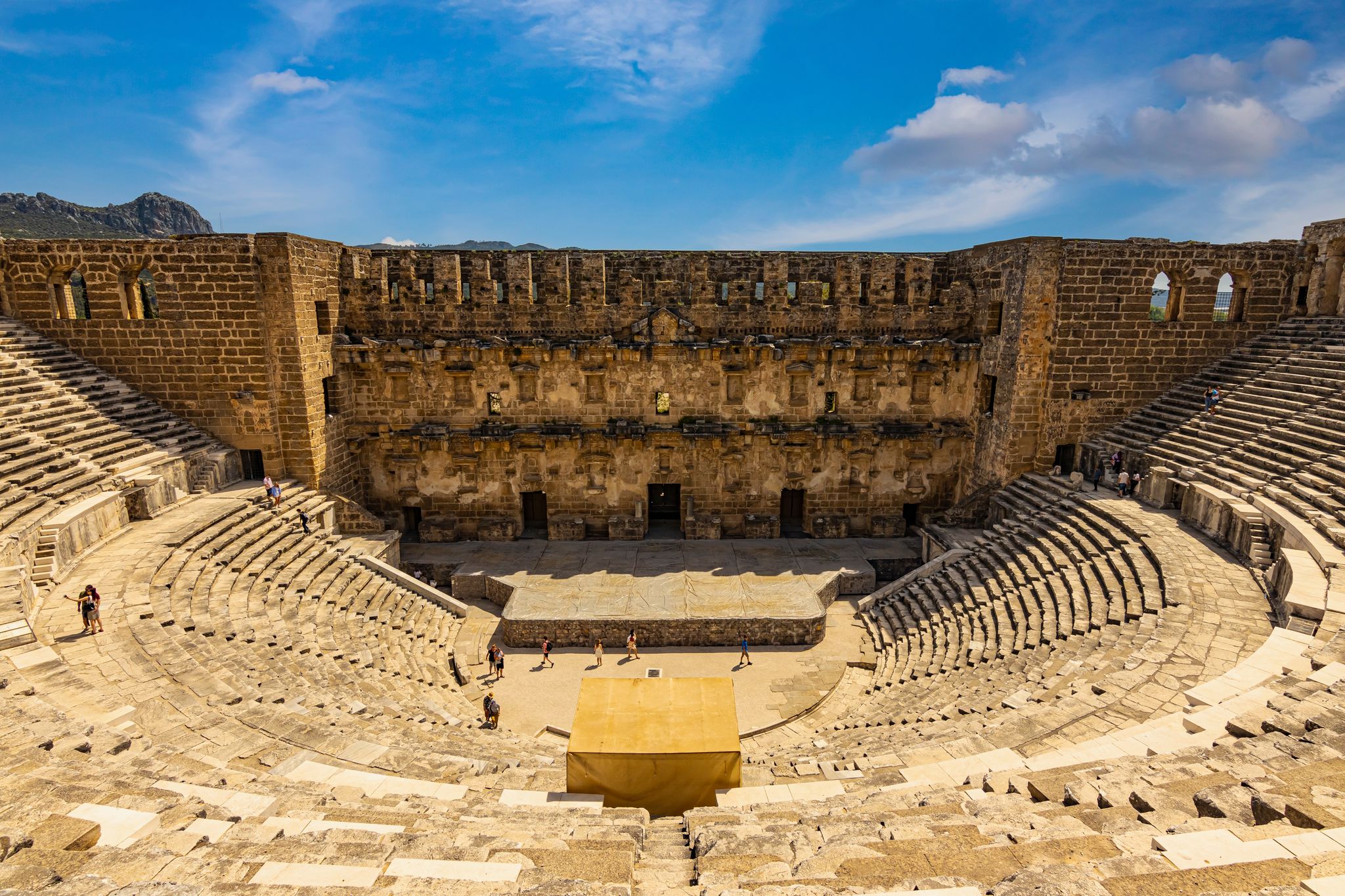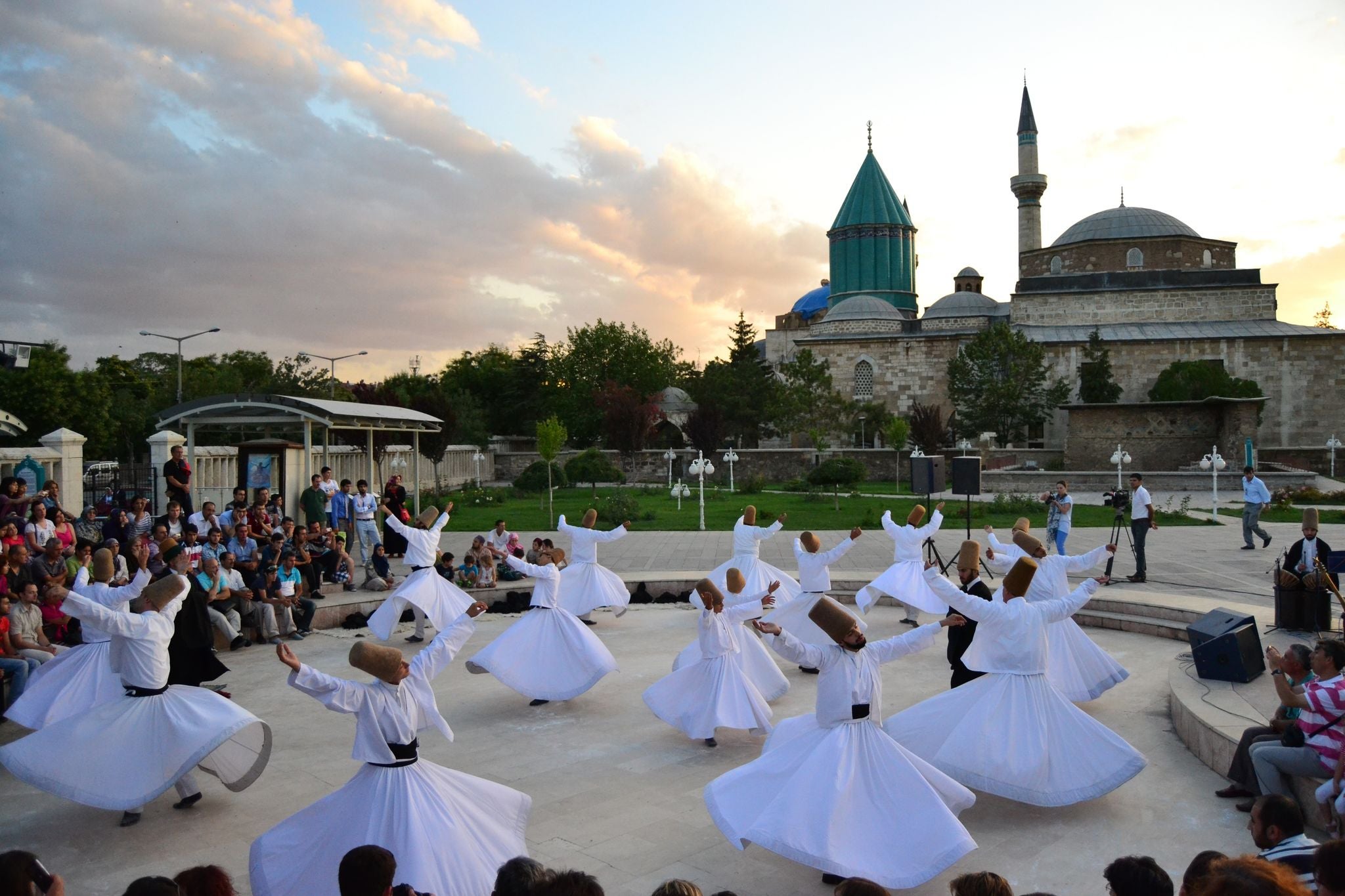




Find out the best time to visit Turkey with seasonal breakdowns, including crowd levels and budget-friendly options. Learn when to visit Turkey to explore the fairy chimneys of Cappadocia, the lively districts of Istanbul, ancient attractions in Izmir, and so much more.
Turkey is a land that blends two continents and offers incredible experiences no matter the season. Knowing the best time to visit Turkey can help you find the trip that suits you best. To make the most of your adventure, check out the wide selection of vacation packages in Turkey.
This guide helps you match your visit with the top activities and experiences in Turkey based on season, weather, and crowds. From hot-air balloon rides in Cappadocia to city adventures in Istanbul, you’ll know when to visit Turkey.
Whether you're planning for city breaks in Istanbul, beach vacations in Antalya, or weekend getaways in Izmir, timing your visit can enhance your trip. By the end of this guide, you’ll know exactly how to book the most affordable accommodation in Turkey.
Ready to discover the best time to travel to Turkey? Dive in and plan your ideal Turkish adventure with confidence!
What’s the Best Season To Visit Turkey?

Turkey is a standout destination, especially in summer (June to August), thanks to its warm, sunny weather. Coastal spots like Bodrum and Marmaris are busy during this time. However, the best season to visit Turkey is spring (March to May), which brings mild temperatures and favorable weather.
It's when Istanbul bursts into color with blooming tulips and wildflowers, making it a lovely time for sightseeing in Emirgan Park and Camlica Hill. Spring is also the best time to explore the ancient ruins of Ephesus and Cappadocia's fairy chimneys without the intense heat.
Autumn (September to November) is another best time to travel to Turkey. The warmth of summer sticks around, so you can still enjoy Turkey's popular beach destinations with fewer crowds. The Ataturk Arboretum and Camlica Nature Park are where you'll see the best of autumn's fiery colors.
Winter (December to March) is the low season in Turkey, but it's great for skiing in places like Uludag. Istanbul, usually bustling with tourists, takes on a quieter, more charming atmosphere during the colder months.
So when is the best time to visit Turkey? Here's a quick breakdown of each season to help you figure out when to visit Turkey based on your preferences.
Turkey in Spring

Spring (March to May) is the best time to visit Turkey for its pleasant weather, blossoming landscapes, and fewer crowds. Temperatures range from comfortable to warm, making it an ideal time for day trips and city sightseeing.
You can explore the ancient ruins in Ephesus in Izmir and go on a sunrise hot-air balloon ride in Cappadocia, benefiting from the mild sunny days. Spring is also the best time to travel to Turkey for outdoor activities, such as hiking along the Lycian Way in Fethiye or exploring the valleys in South Cappadocia.
If sightseeing is your priority, the best season to visit Turkey is spring. You'll find fewer visitors during this time, making informative walking tours in Turkey more enjoyable. Plus, prices tend to be lower than in peak summer, so you can stretch your budget further.
Turkey in spring lets you experience more with fewer crowds. Popular sights like the Blue Mosque and Hagia Sophia are less crowded, and it's easier to find a seat in restaurants. The tulips blooming in Emirgan and Gulhane Parks add a lovely touch to your sightseeing.
Turkey in Summer

From June to August, summer in Turkey attracts many visitors. Beach lovers are especially drawn to coastal destinations like Bodrum, Alanya, Kusadasi, and Marmaris. The coastal regions experience warm and dry weather with temperatures above 86 F (30 C), making them ideal for refreshing beach vacations in Turkey.
Summer is the best time to visit Turkey, especially for beach holidays. However, it can get very hot and crowded in famous spots like Istanbul and Cappadocia.
When the inland cities heat up, the cooler mountain regions become a perfect retreat. In the north of Turkey, Trabzon and Samsun offer a refreshing escape from the heat. With its lush landscapes and calm lakes, a relaxed 7-day self-guided road trip from Trabzon will help you unwind and cool off in summer.
Remember, summer is peak season, so it's a good idea to book your flights to Turkey and accommodations about six months in advance. This way, you can get the best deals and avoid last-minute stress.
Turkey in Autumn

From September to October, Turkey offers a peaceful atmosphere with more locals than visitors around. The weather is still warm and sunny, making it the best time to visit Turkey for outdoor adventures and sightseeing.
If you want to see the country’s autumn scenery at its peak, think about going on a 14-day self-guided Turkey road trip from Antalya through the countryside or admiring the view up in the sky with an exciting paragliding adventure over Fethiye. You'll come across rolling hills, green valleys, coastal roads, and lovely villages, each offering beautiful views worth capturing.
This season is also one of the best times to travel to Turkey’s popular spots, such as Istanbul, Pamukkale, Antalya, and Cappadocia. During this time, you can avoid huge crowds and take the opportunity to interact with the locals.
Thinking of when to visit Turkey for its wine? Autumn is your best bet. It marks the start of the harvest season, so you can join in on the fun at local food and wine festivals that kick off during this season.
Turkey in Winter

From December to February, Turkey brings snowy winter adventures, peaceful sightseeing, and fewer crowds. During winter, the snow-covered fairy chimneys of Cappadocia are breathtaking, and skiing in Mount Erciyes is popular.
In December, Turkey's weather varies from mild to snowy or rainy to dry cold, depending on the region. Despite the cold, cities in Turkey stay lively. Istanbul comes alive with bustling markets, art exhibitions, and live performances, making it the best season to visit Turkey for enriching cultural activities in Istanbul.
Visiting Turkey in winter is also the best time to soak in traditional Turkish bath experiences. Relax in the warm steam, treat yourself to a soothing massage, and emerge feeling rejuvenated.
December in Turkey falls in the low season (except for the holiday rush), which means cheaper accommodations and flights. It's the best time to travel to Turkey and enjoy a more relaxed, traditional atmosphere without the crowds.
When Is the Best Time To Visit Turkey?

For mild weather and fewer crowds, spring (April to May) and autumn (September to October) are the best time to travel to Turkey. You can freely explore Istanbul's streets, wander the valleys of Cappadocia, and visit the ancient sites of Izmir without the crowds and intense heat.
Summer (June to August) is all about hot days and beach vibes. Coastal cities like Bodrum and Marmaris are at their peak, while inland areas like Istanbul can get quite hot and humid. For budget travelers, winter (December to March) is the best time to visit Turkey, except during the holiday season in December.
Whether you're chasing sunshine, scenic views, winter thrills, or informative historical tours, deciding when to visit Turkey should match your interests. Read more for more tips and inspiration to help you figure out the best time to visit Turkey for your trip.
Cheapest Time To Visit Turkey

If you're looking for the cheapest time to visit Turkey, the low season (November to March) allows you to enjoy a budget-friendly experience. You can spend 4 days on a city break in Istanbul and visit popular attractions like the Grand Bazaar and Hagia Sophia without breaking the bank.
While not the most common choice, winter is the best time to visit Turkey for lower accommodation and travel costs. To optimize your savings, book your flight and accommodation at least three to six months in advance. Additionally, tours often offer discounts and promotions during this period to attract visitors.
Whether it's a cozy boutique hotel or an exciting adventure tour, you'll find plenty of ways to save money during the low season in Turkey.
Best Time To Visit Turkey for Festivals and Events

If you're on the lookout for exciting events and festivals, the best time to visit Turkey is summer. This season is packed with famous festivals, like the Cappadox Festival in May and the Istanbul Music Festival in June, which features world-class performances in historic venues.
For a taste of traditional Turkish culture, consider the Kirkpinar Oil Wrestling Festival in Edirne, held between late June and early July. This festival is a spectacle of strength and skill. Every year, thousands of spectators gather to cheer on the wrestlers and soak up the festive atmosphere.
Nature lovers and photographers will fall in love with the Tulip Festival in Istanbul every April. Each year, millions of tulips bloom in public spaces like Gulhane Park and Emirgan Park, transforming the city into a breathtaking flower wonderland.
When To Visit Turkey for Smaller Crowds

If you want to explore Turkey without the crowds, the shoulder seasons of spring (March to May) and fall (September to October) are ideal. These are the best months to visit Turkey for smaller crowds perfect for sightseeing in popular destinations like Istanbul, Cappadocia, Antalya, Izmir, Pamukkale, and Bodrum.
Winter (December to February) is another best time to visit Turkey for fewer crowds. Popular spots like Grand Bazaar, Hagia Sophia, and Spice Bazaar become much less crowded, allowing for peaceful exploration.
The shoulder and low seasons are the best times to travel to Turkey for a calm and authentic experience. With fewer travelers and a relaxed vibe, you can connect with the country’s beauty and culture without the stress of the peak season.
Best Time To Visit Turkey For Good Weather

The best time to travel to Turkey for good weather is in spring (April to June) and autumn (September to October). With temperatures ranging from 59 F to 77 F (15 C to 25 C), these seasons are just right for exploring without the summer heat.
It’s the best time to visit Turkey for outdoor activities in popular destinations such as Istanbul, Cappadocia, and Izmir. Embrace the pleasant weather and go on adventures like a thrilling sunset quad safari ride in Cappadocia. Enjoy the rollercoaster ride in the Land of Legends Theme Park in Antalya, or hike traditional villages in Cappadocia.
Best Time for a Beach Vacation in Turkey

Summer is the best time to visit Turkey for beach vacations. From June to August, you can expect warm temperatures ranging from 77 F to 99 F (25 C to 35 C), clear skies, and crowded beaches. Enjoy the summer heat by heading on the golden sands of Bodrum, spending a 10-day Turkey beach holiday in Alanya, or partying in Marmaris.
Beyond lounging on the beach, you can chase waterfalls in Turkey, such as the Ucansu and Manavgat waterfalls in Antalya. It’s also the peak season, so expect crowds, high prices, and limited availability of flights and accommodation unless you book at least six months in advance.
While summer boasts the hottest months in Turkey, late spring and early autumn are perfect for enjoying the beach without crowds. Head to cities like Alanya, Kemer, or Side for that late-season beach escape.
When to Visit Turkey for Hot-Air Balloon Rides

The best time to visit Turkey for a hot-air balloon ride is from April to June and September to November. There is less chance of heavy rain or wind, which can result in rescheduling or canceling activity.
During these months, the steady weather and clear skies are perfect for sky-high sightseeing flights in Turkey. For the most dramatic views, you can float over Cappadocia's fairy chimneys or soar above Pamukkale's terraces, especially at sunrise or sunset.
Best Time for a Bosphorus River Cruise

For a smooth Bosphorus River cruise, the best time to travel to Turkey is from April to June and September to November. During these months, you'll be treated to picture-perfect weather and breathtaking views, making it the best time to visit Turkey for a Bosphorus river cruise.
With mild weather and clear skies, you'll have uninterrupted views of Istanbul's iconic skyline, historic landmarks like the Bosphorus Bridge and Dolmabahce Palace, and captivating sunsets. Capture Instagram-worthy shots on a festive Bosphorus dinner cruise from Istanbul or a luxurious yacht tour to the Asian side of Turkey.
Best Time for a Honeymoon in Turkey

Spring and autumn are the best seasons to visit Turkey for honeymoons, offering comfortable weather and fewer crowds. These times are perfect for outdoor adventures and exploring new places together—everything you need for romantic experiences in Turkey.
In spring, couples can stroll through the blossoming streets of Istanbul, visit ancient sites like Ephesus, and enjoy the magic of Cappadocia with its magical hot-air balloon rides. Meanwhile, early autumn is perfect for a peaceful one-week beach holiday in Fethiye.
What’s the Best Month To Visit Turkey?

For a balance of pleasant weather, fewer crowds, and a variety of activities, April to May and September to October are the best months to visit Turkey. It’s the best time to catch the sunrise in Cappadocia, wander through the streets of Istanbul, or check out the historic landmarks in Izmir.
If you're after a beach getaway, June to August is the best time to travel to Turkey's Mediterranean and Aegean coasts. Coastal cities like Bodrum, Marmaris, and Antalya are perfect for swimming and sunbathing. Just be aware that summer is the peak season, so expect higher prices and larger crowds.
For a quieter, more affordable trip, the winter (December to February) is the best time to visit Turkey. While it's colder, you can enjoy Istanbul's festive vibe and explore snow-covered Cappadocia without the usual crowds.
In this chapter, we’ll break down Turkey month by month, showing you the best, most affordable, and most underrated time to visit Turkey. Read on for all the tips to plan your perfect Turkish getaway.
January in Turkey

January is the coldest month in Turkey, with an average of 41.8 F (5.1 C). Inland cities like Istanbul and Ankara experience occasional snow, while coastal cities like Antalya have milder temperatures. This month invites all nature lovers to embrace the chilly weather and go skiing in Mount Erciyes in Kayseri.
Beyond skiing, it's the best month to go to Turkey for enriching cultural activities in Goreme. You can enjoy a traditional Whirling Dervishes performance or see the fairy chimneys dusted in snow.
During this time, you'll find lower prices on accommodations and flights, especially in popular cities like Istanbul and Cappadocia. You can experience the ultimate winter holiday in Istanbul, wandering through museums, mosques, and historical landmarks without the crowds.
While visiting in January offers fewer crowds, it's essential to plan ahead due to possible limited availability in some hotels and tours, especially in popular destinations like Sultanahmet.
February in Turkey

The country continues to be chilly during February, with average temperatures of 30 to 41 F (-1 to 5 C). With fewer visitors, iconic landmarks such as Hagia Sophia and Topkapi Palace in Istanbul become peaceful havens, allowing you to explore at your own pace.
In February, the coastal region in Turkey is where you can find the mildest weather. Historical sites such as the ancient ruins of Ephesus in Denizli can be visited, offering insights into Turkey’s rich heritage. For warmth, a steamy Istanbul Turkish bath provides a relaxing and traditional experience.
February also offers the advantage of low-season pricing, with potential deals on flights and accommodations. It's one of the cheapest times to visit Turkey.
March in Turkey

March is the beginning of spring. Crowds haven't arrived yet, but the days are getting longer, and the weather is turning more pleasant. Depending on where you go, you might experience wintery or warm weather, as March can be unpredictable.
Turkey in March brings an increase in rainfall, especially along the coastal cities like Antalya and Bodrum. In Istanbul, expect moderate rainfall. In case of rain, you can visit the city's indoor attractions, such as the Grand Bazaar and Basilica Cistern.
If you want to explore the country’s top attractions without the crowds or hot weather, then March is the best time to visit Turkey. As March falls within the low season in Turkey, there are often excellent deals on accommodations and flights, particularly in popular cities like Ankara and Izmir.
April in Turkey

April brings pleasant weather and the annual Istanbul Tulip Festival, showcasing tulips in full bloom in parks across Istanbul. Turkey experiences more sunshine and moderate temperatures of about 44 to 64 F (7 to 18 C). It’s the best month to go to Turkey for engaging sightseeing tours in Istanbul and fun outdoor adventures in Goreme, Cappadocia.
Explore the country’s rich heritage by visiting ancient ruins, architectural wonders, and bustling bazaars. Notable sites include the majestic Hagia Sophia and the mystical landscapes of Cappadocia.
May in Turkey

May is the best time to visit Turkey to enjoy warm, sunny days without the scorching summer heat and huge crowds. With the summer heat still not kicking in, you can comfortably explore Pamukkale's ancient sites and rejuvenating thermal waters.
This month is the peak season in Istanbul and Cappadocia, so it’s advisable to book your accommodations in Turkey and flights 5-6 months in advance. Booking skip-the-line tickets for Istanbul’s top attractions for your tours can also help avoid waiting in long lines.
For more detailed insights, check out the comprehensive Turkey in May guide. This will help you discover all that this beautiful country has to offer during this lovely month.
June in Turkey

It's the official start of the summer season, with hot weather and plenty of sunshine. June is the best time to travel to Turkey for beach lovers and those who enjoy the buzz of peak season. Coastal cities like Antalya, Alanya, Marmaris, and Bodrum are popular for relaxing beach vacations.
June is also the best month to visit Turkey to get ahead of the crowds and enjoy a peaceful beach escape. For a different experience, sailing trips in Turkey along the Aegean or Mediterranean take you to secluded coves and hidden beaches.
In inland cities, the weather is hot but not overly humid. This month is the best time to visit Turkey's historical gems, like Topkapi Palace, the Museum of Anatolian Civilizations, and Ankara Castle.
July in Turkey

July is the hottest month in Turkey, with scorching temperatures and crowded beaches. Popular coastal hotspots like Antalya, Alanya, Bodrum, Marmaris, and Oludeniz charm visitors with refreshing beach vacations.
The weather might make exploring during the day difficult, but July nights are full of energy. You can enjoy delicious meals at restaurants with rooftop views or go on a fun-filled pub crawl in Istanbul to dance all night at clubs. It's the best time to travel to Turkey to enjoy its nightlife.
While coastal areas sizzle with activity, cities like Istanbul, Ankara, and Cappadocia are less crowded due to the high heat. To make the most of your visit, consider booking skip-the-line tickets for tours and activities to avoid queues at major attractions.
Additionally, renting a car in Turkey provides a comfortable means of transportation. It gives you the flexibility to escape the crowds, venture off the beaten path, or explore scenic countryside during the long summer days.
August in Turkey

August brings hot and dry weather conditions. You can escape the heat by visiting the cooler cities of Trabzon, Samsun, Amasya, and Giresun on a scenic 6-day Turkey road trip to the Black Sea region, which is known for its lush greenery. You might also stumble upon local harvest festivals, adding a unique cultural flair to your summer getaway.
As summer reaches its peak, August marks the busiest time for visitors in coastal cities like Marmaris and Antalya. It's crucial to plan ahead and book flights and accommodations early, especially for popular destinations and beach resorts.
September in Turkey

September is a break from the hot summer months. To enjoy a relaxing summer vacation outside the busiest time of year, September is the best time to travel to visit Turkey. This month is still great for refreshing beach vacations in Bodrum, offering peace and more budget-friendly options than the peak summer months.
As the temperatures cool, Istanbul comes alive with visual exhibitions, delicious food, and endless fun. You can also check out the ancient ruins of Ephesus, with only a few crowds. September is the best time to visit Turkey for city sightseeing and tasty food adventures in Istanbul.
However, this month is also the high season in Istanbul and Cappadocia. So expect higher accommodation prices and a lot of other travelers. But if you book your accommodation and flights in advance, traveling in September is still a good choice.
October in Turkey

October in Turkey is generally mild and pleasant, with cooler evenings. It's the shoulder season, but Istanbul and Cappadocia remain particularly busy. While cities buzz with activity, the rest of the country offers a more peaceful experience. Hiking trails, like the Lycian Way and Pigeon Valley, are perfect for outdoor lovers looking to soak in autumn's beauty.
A notable activity is taking a hot-air balloon ride over Cappadocia’s surreal landscapes. This lovely season bathes the fairy chimneys with autumn colors.
Additionally, a visit to Pamukkale’s white terraces and the ancient city of Ephesus is pleasant in October. If you're looking for the warmest destinations during this time, head south to cities like Antalya and Alanya.
November in Turkey

November marks the start of the rainy season and winter in Turkey. If you’re looking for the best month to go to Turkey for a quieter trip, November offers fewer crowds and authentic experiences.
The best thing to do in Turkey in November is to explore the cultural sites of Istanbul. You can shop in the Grand Bazaar or relax in a traditional Turkish bath, as these activities are not dependent on the weather.
With way fewer crowds than peak season, you might find some last-minute deals on accommodations and flights this month. November offers a more personal and peaceful experience with even cooler weather, making it one of the best times to travel to Turkey.
December in Turkey

December is the best time to visit Turkey for its winter charm and cultural delights. The country cools down with snow and rain, though Antalya stays mild. The summer crowds are gone, replaced by a festive vibe that offers a chance to see a different side of the country.
December is the best month to visit Turkey for a peaceful sightseeing adventure. With fewer crowds, this month immerses you in Istanbul’s architectural gems and Pamukkale’s stunning natural landscapes.
As the weather in Turkey gets cold this month, traditional Turkish baths are especially enjoyable. Additionally, the fairy chimneys of Cappadocia are even more otherworldly than usual when it snows in December.
When Is the Best Time To Travel to Turkey?

Turkey is a treasure trove of diverse landscapes, rich history, and unique experiences. Given its popularity, knowing when to visit Turkey can enhance your trip.
The peak season is from June to August when the beaches are busy, coastal cities like Bodrum and Antalya are buzzing, and the days are long and sunny. Prices are up, and so are the crowds. If you're all about beach vibes and don't mind a lively scene, this is the best time to visit Turkey.
Shoulder seasons, in spring (April to May) and fall (September to October), offer the perfect balance—mild weather, fewer tourists, and better deals. It's ideal for exploring Turkey's historic gems or getting lost in the streets of Istanbul without feeling overwhelmed.
During the low season in Turkey (November to March), the scene changes. With cooler temperatures, fewer tourists, and quieter streets, it's the best time to travel to Turkey for a relaxed, budget-friendly escape. You'll enjoy a more personal experience, especially in places like Istanbul or the snow-covered landscapes of Cappadocia.
Thinking of when to visit Turkey? This guide will break down the travel seasons in Turkey to help you plan your visit. Read more to avoid crowds, secure better deals, and enjoy the country's sights and experiences in the best possible conditions.
Peak Season in Turkey: June to August

Peak season in Turkey typically falls during the summer months, from June to August. With hot weather, especially in Istanbul, beach resorts in coastal cities like Bodrum and Marmaris are filled with people who prefer water and swimming.
Head to the Black Sea Region if you're not into the crowds and the heat. Cities like Trabzon, Rize, and Samsun offer a refreshing escape with cooler temperatures than the rest of Turkey.
To ensure a seamless experience during the peak season, it's a good idea to book tours and accommodations in advance. This helps secure your spot on guided excursions to iconic landmarks and ensures you have accommodations in desirable locations.
Shoulder Seasons in Turkey: April to May and September to October

The shoulder season in Turkey is in spring (April to May) and fall (September to October) is considered the best time to visit Turkey. These months offer mild weather that is ideal for outdoor activities, like trekking in Cappadocia and exploring Istanbul on foot.
This is also the best time to travel to Turkey and explore the well-preserved ruins in Ephesus, including the Library of Celsus and the Great Theatre. In May and September, you can enjoy beach destinations like Alanya and Bodrum with fewer crowds.
Low Season in Turkey: November to March

Often missed by vacationers, the low season (November to March) is the best time to visit Turkey if you want smaller crowds and affordable adventures. Flights and accommodations are generally cheaper during this time, making it ideal for budget travelers.
In Istanbul, you can explore popular spots like the Hagia Sophia, Topkapi Palace, and the Istanbul Archaeological Museums without the usual crowds. Just don't forget a warm jacket—winter temperatures can be chilly and wet, especially at night.
Thermal spas, like those in Pamukkale and Afyonkarahisar, are especially inviting during the low season in Turkey. For those willing to brave the cold, enjoy the panoramic hot air balloon flights in Goreme to see Cappadocia's snow-covered landscapes.
When To Visit Turkey's Top Destinations?

Turkey has diverse landscapes and climates, meaning the best time to visit can vary depending on the region. Coastal hotspots like Antalya, Cesme, Fethiye, and Bodrum peak in the summer, offering warm weather, clear skies, and lively beach scenes.
Meanwhile, Turkey's major cities like Istanbul and Izmir are perfect for spring and fall exploration, thanks to milder temperatures and lower humidity. For a truly magical experience, Cappadocia's stunning landscapes are best enjoyed during the shoulder seasons, when the weather is ideal for hot-air ballooning.
This chapter will introduce you to the best time to visit Turkey's most popular destinations, highlighting the must-see spots in each place.
When To Visit Istanbul

Istanbul enjoys a mild climate throughout the year, making it a go-to destination in every season. However, many travelers prefer the less crowded shoulder season in Istanbul (March to May and September to October) for the most favorable weather conditions.
During these months, you can go on a walking tour in Istanbul without battling crowds. You can also hop on one of the many memorable Bosphorus dinner cruises in Istanbul to witness the city’s stunning illumination at night while enjoying delightful Turkish cuisine.
If you're on a budget-friendly quest for adventure, the best time to visit Istanbul is during the low season (November to February). Despite the cooler weather, this period offers great deals on accommodations, except for the festive period around the end of December. Going on a New Year's Eve Bosphorus dinner cruise is ideal during this time.
To help you make the most of your trip, check out this detailed guide to the best time to visit Istanbul so you can plan your adventure, no matter the season.
When To Visit Cappadocia

The best time to visit Turkey's Cappadocia is during the late spring (April to June) and early autumn (September to November) when the weather is pleasant. During these months, the weather is just right for a magical Cappadocia hot-air balloon ride. However, keep in mind that early April can be windy, which might affect balloon flights.
Aside from the hot-air balloon rides over the fairy chimneys, there are still plenty of things to do in Cappadocia. Popular options are hiking in South Cappadocia or visiting the historical sites in North Cappadocia.
While hot-air balloons operate year-round, weather conditions like wind, rain, or snow may lead to cancellations. To make the most of your experience, it's best to book your hot-air balloon tour on the first day of your visit. This allows for flexibility in case of unexpected weather conditions and ensures that you won't miss out on this special opportunity.
When To Visit Antalya

Antalya enjoys a Mediterranean climate, with hot summers and mild winters. If you're dreaming of sunny days, the best time to visit Antalya is from June to August. During these months, you can soak up the sun, swim in crystal-clear waters, and visit the Maldives of Turkey on a boat tour from Antalya.
For those who prefer to avoid crowds and enjoy milder weather, consider visiting Antalya during spring (April to mid-June) or autumn (September to mid-October). These seasons offer pleasant temperatures and fewer crowds, making them suitable for rafting, boat tours, and other splashy water activities in Antalya.
If you're visiting in winter, keep in mind that January is the coldest month in Antalya, with cooler temperatures and occasional rain. However, winter travelers can still enjoy the quieter side of the city and nearby attractions, like the Antalya Archeology Museum.
Ultimately, the best time to visit Antalya depends on your preferences. Summer is ideal for beach lovers, while spring and autumn offer a more relaxed vacation with fewer crowds.
When To Visit Izmir

Izmir is a popular destination in summer (June to August). It's the best time to visit Izmir to lounge on sandy shores, take refreshing dips in the sea, and dance the night away at lively beach clubs.
If you prefer engaging city sightseeing tours in Izmir rather than the beach, September is the best time to go to Izmir. The crowds thin out, the days become pleasant, and the sea remains inviting for a swim. It's the perfect time to explore Ephesus highlights on a private tour without the summer hustle and bustle, creating a peaceful and enjoyable experience for all.
Spring, with its blooming flowers and mild temperatures, is your go-to season for appreciating Izmir's unique architecture and cultural heritage. It's the ideal season for leisurely explorations, like wandering through historic landmarks or strolling along the waterfront promenades.
When To Visit Pamukkale

Spring is one of the best times to visit Turkey’s Pamukkale in Denizli, offering mild weather and fewer crowds. From April to June, temperatures are just right at around 68 F (20 C).
Pamukkale continues to enchant visitors from September to November. With pleasant weather and cultural festivals like the International Pamukkale Music and Culture Festival in Denizli, September is a great time to visit.
Beyond the iconic white terraces, Pamukkale’s hidden treasures, such as the ancient Amphitheater and the Hierapolis Archaeology Museum, are also must-visit destinations in spring. For adventurous souls, activities like paragliding adventures and scenic hot-air balloon rides in Pamukkale are available.
Tips for Planning a Trip to Turkey for Every Season

Planning a trip to Turkey can be exciting but requires some preparation to ensure a smooth and enjoyable experience. Here are some travel tips to help you make the most of your trip:
- Dress appropriately for the weather in Turkey: Depending on the season and region, pack suitable clothing. In the summer, lightweight and breathable outfits are a must. For the colder months, layers and warm clothes are essential. Remember that conservative attire may be required when visiting religious sites.
- Book flights and accommodations in advance: Especially during peak season, booking your flights and accommodations in advance can save you money. This not only secures your stay but also helps you find better deals and options.
- Consider guided tours in Turkey: Expert guides can provide valuable insights and context to the various historical sites you’ll visit, enhancing your experience. They’ll also help you navigate popular attractions more efficiently.
- Attend local cultural events: Participating in local festivals, markets, and events in Turkey allows you to experience Turkish culture firsthand. These events provide a deeper understanding and appreciation of the local traditions and way of life.
- Take advantage of public transportation: The country features an extensive and affordable public transportation system, including buses, trams, and ferries. It's a great way to get around cities like Istanbul.
- Be prepared for the call to prayer: The call to prayer happens five times a day and can be heard throughout the cities. It’s a part of daily life and can be a unique cultural experience.
- Carry local currency: The Turkish lira (TRY) is the local currency. It's good to have some cash on hand for small purchases, as not all places accept credit cards.
- Learn basic Turkish phrases: While many people in central business areas speak English, learning a few basic Turkish phrases can enhance your travel experience. Simple words like "Merhaba" (Hello), "Teşekkür ederim" (Thank you), and "Lütfen" (Please) are appreciated.
These tips can help ensure a smooth and enjoyable trip to Turkey, allowing you to fully immerse yourself in the country’s rich culture and history.
Is There a Bad Time To Visit Turkey?

No, there is no bad time to visit Turkey. Each season offers unique experiences and opportunities to explore the country’s diverse attractions. Whether you prefer spring's blossoms, summer's sunshine, autumn's golden hues, or winter's cozy ambiance, Turkey has something to offer year-round.
For beach lovers and those after a lively vibe, the summer (June to August) is the best time to travel to Turkey, but be ready for larger crowds and higher prices. If you’re looking for a quieter, more budget-friendly experience, the low season in Turkey (November to March) is a great option. Just keep in mind that the coast may be cooler or less accessible.
The shoulder seasons, spring (April to May) and fall (September to October) bring mild weather and fewer crowds. You'll find the ideal conditions for sightseeing, hiking, and exploring Turkey’s historical gems.
Ultimately, the best time to visit Turkey depends on your interests and what excites you the most. For the best experience, you can choose among the top-rated vacation packages in Turkey and enjoy a well-planned itinerary for your Turkish adventure.
FAQs About the Best Time To Visit Turkey

What is the coldest month in Turkey?
The coldest month in Turkey is typically January. During this time, temperatures range from 39 F to 54 F (4 C to 12 C). Coastal areas like Istanbul, Izmir, Denizli, and Antalya enjoy milder winters with averages from 46 C to 15 C (46 F to 59 F). However, in Eastern Anatolia, you'll experience heavy snowfall and temperatures well below freezing.
What is the hottest month in Turkey?
The hottest month in Turkey is typically July. During this time, temperatures can soar, especially in inland areas and along the southern coast. Coastal cities like Antalya and Bodrum experience highs, often reaching up to 95 F (35 C) or more.
Meanwhile, inland areas like Ankara can see temperatures climbing above 90 F (32 C). It’s the best time to visit Turkey for beachgoers and sun-seekers to enjoy Turkey's beautiful coastlines.
How many days are enough for Turkey?
To truly experience Turkey, plan for at least 7 to 10 days. This timeframe allows you to explore the key highlights in Turkey. Start with Istanbul, spending 3 to 4 days diving into its rich history by visiting iconic sites like the Hagia Sophia, Blue Mosque, and Topkapi Palace, and wandering through the Grand Bazaar.
Next, head to Cappadocia for 2 to 3 days to marvel at the unique landscapes, enjoy a hot air balloon ride, and explore the ancient cave dwellings. Dedicate a day to explore Ephesus, where you can visit the well-preserved ancient city and its remarkable ruins. Another day should be spent at Pamukkale, experiencing the stunning white terraces and thermal springs.
If you’ve got the time, stretch your trip to two weeks to explore the Mediterranean coast or Eastern Anatolia and enjoy a sun-kissed 10-day beach holiday in Kemer. This way, you can savor every moment and truly experience all the diverse beauty and culture Turkey has to offer.
When is the best time to visit Turkey to beat the crowds?
If you want to beat the crowds in Turkey, aim for the shoulder seasons of spring (April to May) and autumn (September to October). These months offer ideal weather without the peak summer rush. It’s the best time to visit Turkey to explore and enjoy what the country has to offer without the hustle and bustle.
